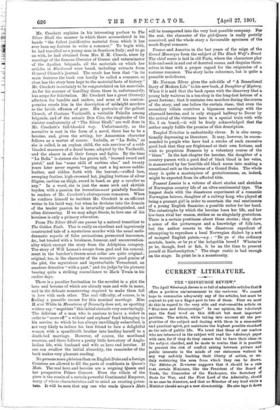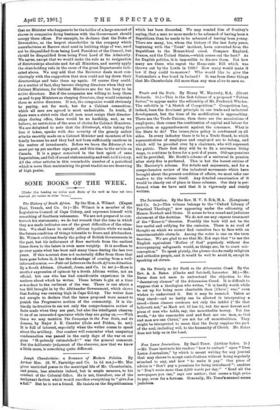C URRENT LITERATURE.
THE "EDINBURGH REVIEW."
The April Rdinburgh Review is so full of admirable articles that it offers a povitive embarrassment to the reviewer. We cannot hope to summarise adequately any of the articles, but must be content to put up a finger.post to two of them. First we must do this in regard to the very able and statesmanlike article on " Ministers and Directorships." In our opinion, the kdinburgh says the final word on this difficult but most important problem. The article, while taking into account all the per- plexities of the subject and dealing with them in a reasonable and practical spirit, yet maintains the highest possible standard as the rule of public life. We trust that those of our readers who are interested in the subject will read the bdinburgh paper with care, for if they do they cannot fail to have their ideas on the subject clarified, and be made to realise that it is possible to prevent the risk of conflict arising between private and Public interests in the minds of our statesmen without in any way unfairly limiting their liberty of action, or un- duly restricting the area from which they can be drawn. I`he Rdinba, gh Reviewer suggests that it should be a rule that certain Ministers, like the President of the Board of Trade, the Chancellor of the Exchequer, the Secretary of State for War, and the First Lord of the Admiralty, should in no case be directors, and that no Minister of any kiud while a Minister should accept a new directorship. He also lays it down that no Minister who happens to be the holder of a large amount of shares in companies doing business with the Government should occupy these offices. For example, he declares that the Duke of Devonshire, as the largest shareholder in the company which manufactures at Barrow steel used in building ships of war, need not be disqualified from being Lord President of the Council, but should be disqualified from being First Lord of the Admiralty. We agree, 'except that we would make the rule as to resignation of directorships absolute and for all Ministers, and merely apply the shareholding rule in the cases of the great Departments indi- cated above. We may add that the Reviewer deals most con- vincingly with the suggestion that men could not lay down their directorships and take them up again. Of course they could. As a matter of fact, they become sleeping directors when they are Cabinet Ministers, for Cabinet Ministers are far too busy to be active directors. But if the companies are willing to keep them on and to pay Ministers as sleeping directors, they would reinstate them as active directors. If not, the companies would obviously be paying, not for work, but for a Cabinet connection. which all men are agreed is most undesirable. In truth, if there were a strict rule that all men must resign their director- ships during office, there would be no hardship, and, as we believe, no restriction of the area of choice for Cabinet Ministers. We are delighted to note that the Edinburgh, while taking the line it takes, speaks with due severity of the grossly unfair attacks recently made on a Cabinet Minister and members of his family because he and they had not been sufficiently cautious in the matter of investments. Before we leave the Edinburgh we must put up yet another sign-post, and this time to the article on Canada. It is a paper conceived in the best spirit of sane Imperialism, and full of sound statesmanship and well-told history. All the other articles in this remarkable number of a periodical which is more than maintaining its great traditions are deserving of high praise.























































 Previous page
Previous page